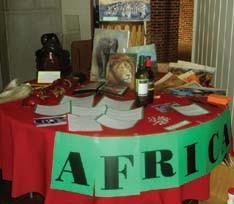
Black History on display (Photo by Melissa Gardner, Contributing Photographer, The Daily Campus)
As Black Heritage Month drew to a close, the SMU Black Law Students Association displayed its Black Heritage Museum yesterday evening in “the pit,” the first floor of the Underwood Law Library. Members of the BLSA gave tours of the exhibit throughout the evening, highlighting accomplishments by historical African-American figures. What began as the inspiration of third-year law student Melissa Gardner to educate the SMU Law community on the contributions of African-Americans, the Black Heritage Museum developed into an artistic reality.
“It is a powerful menagerie of the [African-American] legacy,” Law professor Maurice Dyson said.
Tours began as the student guides began by highlighting the rich history and culture of Africa, displaying traditional African clothing, natural resources, and food. Following this, the tour focused on the musical sounds of contemporary African-American musicians, including Aretha Franklin. Sporting, political and scientific contributions made by African-Americans all had their own sections on the tour, as did literature, arts and contemporary entertainment.
The tour concluded with disturbing images of slavery and the struggles of segregation in the U.S. The display included newspaper clippings auctioning off “property,” which included books, livestock, and African-American slaves.
“People selling the slaves equated living, breathing people with objects,” tour guide and law student Yulise Waters said.
After this, the tour highlighted the struggles and triumphs from Jim Crow to the Brown v. Board of Education decision, to the Civil Rights March on Washington. Waters also gave a chilling account of black WWI soldiers who, upon receiving medals of honor, were promptly lynched in uniforms.
“We are merely a conduit opening the door to motivate our peers to join us in effecting change,” BLSA President Yodi Hailemariam said. Recognizing that museums have traditionally been the vehicle for timelessly preserving history while encompassing current developments, BLSA members felt that a heritage museum would be the perfect tool for reminding the faculty, professors, and students that black heritage is not about one moment in time or one month of the year, but it is about an evolving culture that spans racial, socio-economic and temporal bounds.
The Black Heritage Museum will be open until 4 p.m. today in the Underwood Law Library.
— Kimberly Jessie contributed to this article.








